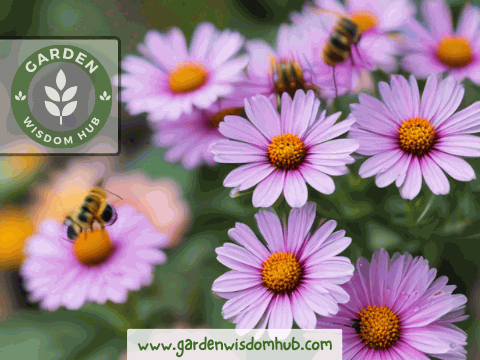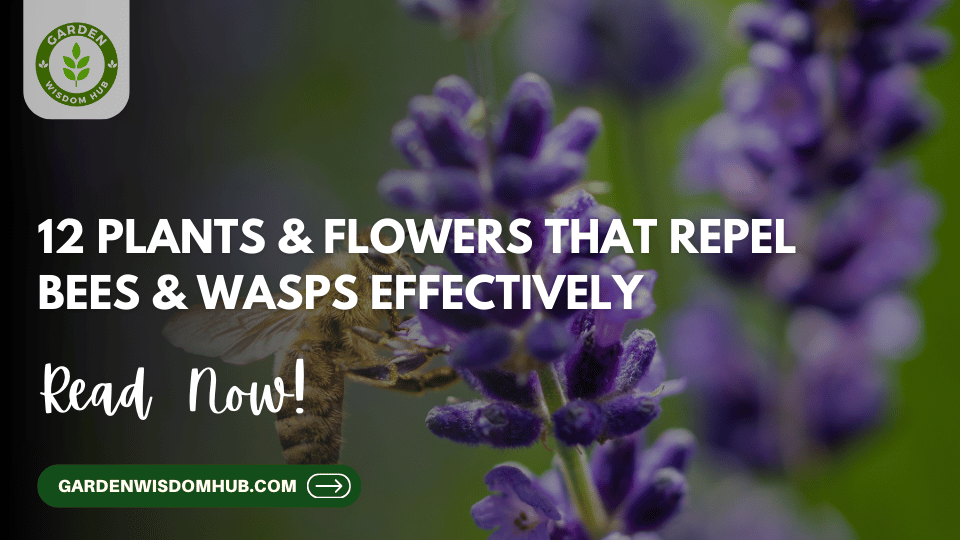Plants That Repel Bees
Explore a variety of plants recognized for their special capacity to repel bees, allowing you to manage a bee-free and peaceful garden space.
The article finds answers to your questions like what flowers keep bees away from plants, what can i use to keep bees away from plants & flowers, what helps keep bees away, what plants rebel bees, and natural Ways to Keep Bees Away.
Potted Plants That Keep Bees Away

Following are the plants That Repel Bees and Mosquitoes. These are the Potted Plants That Don’t Attract Bees and also include other flowers and Plants Known to Repel Bees and Wasps.
Does lavender keep bees away from plants?
Lavender is widely recognized for its lovely fragrance and attractive purple flowers, but most people are not aware that this unique quality of lavender is that, it keeps bees away. Bees are directed to locate their nectar elsewhere because of the pleasant aroma of lavender, so it not only makes the surrounding smells elegant but also plays a major role in the repelling of bees. If you are wondering how you keep bees away from you, consider planting lavender.
This process is not that difficult, by putting pots of lavender around your garden, you can make sure that bees do not bother you much. Plus, it makes your garden pretty attractive as well as takes part in the aroma of the garden.
Marigolds:
Marigolds beautify your yard and deter bees. Bees flee their strong scent and brilliant colors. You may dissuade bees from your garden in several ways. Spread them out or put them in containers. Marigolds repel bees and beautify any room. Aren’t those flowers clever? To keep your garden beautiful and bee-free, add marigolds each time you tend to it. It’s a clever and fun method to keep your landscape charming
Marigolds are excellent deterrents for bees in addition to being beautiful flowers. Their powerful scent and vivid colors tend to frighten away bees. To keep bees away from your garden, you may either sprinkle them around or plant them in containers. Marigolds are important because they keep bees away in addition to being pretty to look at. Thus, the next time you’re doing a little upkeep on your garden, consider adding some marigolds to keep it lovely and bee-free.
Does basil repel bees?
Basil can not only be used to prepare delicious foods, but it can also help in keeping bees away from your house. Bees are warned not to get into your home by the organic wall that basil creates when it is planted near doors and windows. Bees will go somewhere else when they smell basil because it serves as an indicator that there is no food for them. Therefore, keep in mind that basil not only adds flavors to your meals but also keeps your home bee-free. Planting basil makes it a more pleasant place to be, whether you’re in the kitchen preparing your favorite meal or relaxing in your garden.
Mint:
Mint is a useful herb that discourages bees from visiting your garden. Bees find it difficult to cross the barrier created by growing mint in pots. Bees are naturally repelled by the intense aroma of mint, which prevents them from staying around. Therefore, consider putting some pots of mint if you want to enjoy your garden without too many bees swarming around. It will not only infuse your outside area with a renewing scent, but it will also deter those annoying bees.
Eucalyptus:
Bees are more attracted by different flower scents than to the distinctive scent of eucalyptus bushes. Bees are naturally deterred from approaching places with eucalyptus plants due to the distinct smell of eucalyptus. Although bees require pollination to live in a healthy ecosystem, the particular scent of eucalyptus is not enough to draw them in. Therefore, you can make an environment that is less attractive to bees by growing eucalyptus in your garden or around your house. This offers a solution for people who prefer to decrease bee activity in specific areas without harming these valuable pollinators.
Wormwood:
You may have seen wormwood wasp repellents. Using wormwood extract, these products can repel wasps and bees. This plant adds elegance to your garden or backyard and repels mosquitoes with its pleasant scent. The wormwood plant hides absinthe, which surprises bees, wasps, mosquitoes, and fleas.
Pennyroyal:
Pennyroyals are amazing bee-repellent plants. It smells like mint yet is compact. Planting and watering the pennyroyal in a small container every day is plenty. Why not keep it indoors or in your backyard to avoid stinging pests? Pennyroyal plants grow in small containers, so we recommend spreading them throughout your home for maximum protection.
Geranium:
For Oklahoma gardeners, a beautiful bouquet can prevent bees and wasps. Geraniums are beautiful and deter bees and wasps due to their unique properties. Fun fact: bees can’t see red. Did you know they can’t see red geraniums? It’s fascinating, right? With minimal pollen, these blooms are even less tempting to stinging pests.
Citronella:
Citronella is used to repel mosquitoes, but bees and wasps dislike its pungent smell. This plant grows indoors and outdoors, making it adaptable. Any gardener seeking flexibility should consider it. To thrive, the plant needs well-drained soil and six hours of sunlight every day. Want to avoid bees, wasps, and mosquitoes? Plant citronella. It’s a clever and cheap solution.
Cucumbers:
Cucurbitacin gives cucumbers a delicious taste, a dash of bitterness, and a compelling scent. This chemical may deter bees and wasps. Did you know growing cucumbers near tomatoes in your food garden will deter insects? It’s clever and effective plant protection! The cucumber peel’s acidity and cucurbitacin make it unattractive to bees and wasps. You may protect tomatoes from pests by planting cucumbers near them.
Pitcher plants:
Pitcher plants eat pests and insects instead of shooing them away. Pretty smart, huh? Pitcher plants don’t hurt bees, which is good for nature and humans. These pollinators can be carefree. Pitcher plants have powerful enzymes in their insides that destroy insects. These plants thrive on pure rainwater and can tolerate intense heat and sunlight. Consider pitcher plant hues that bees don’t like for pest control.
Lemongrass:
Lemongrass is clever at repelling bees. Wet soil and strong sunlight make gardening easy. Did you know lemongrass has many uses beyond tea and cooking? Why not pot lemongrass and make a yard “repellent station”? It’s an inventive and entertaining bug repellent. Lemongrass smells great to humans, but bees and other insects hate it due to its high citronella content.
What Helps Keep Bees Away?
Following are some amazing tips on how to Keep Bees Away from Flowers and Plants, how to Keep Bees Away from Your Home, and how to Get Rid of Bees in Your Yard. Moreover, Preventing Bees from Coming Back through natural ways of repelling bees is also discussed.
Avoid saccharine scents:
Bees are attracted to sweet smells, so avoid using sweet-smelling colognes, perfumes, and sunscreens.
Discover how to keep bees away from your yard by planting bees repelling plants:
Some plants repel bees. Neem, mint, citronella, eucalyptus, cloves, wormwood, geraniums, basil, cucumber, marigolds, and pennyroyal. Consider planting these plants in your garden to deter buzzing insects.
How to keep bees away from the house naturally?
- Try essential oils to repel bees. Bees dislike lavender, tea tree, citronella, citrus, peppermint, clove, rosemary, eucalyptus, cinnamon, and cedarwood. Keep bees away by diffusing these oils.
- Protect Your Food and Drink: Cover or seal sweets and drinks to avoid bees.
- Avoid Green, Blue, and UV Colours: Avoiding these colors reduces bee attraction.
- Alter Your Habitat: Change your surroundings to deter bees. This may involve removing water sources and changing local plant species.
What to Use to Keep Bees Away?
Try Vinegar:
Its strong smell deters bees, making it a natural insecticide.
Try Citronella Candles:
Bees dislike citronella, therefore burning candles can deter them. Try cinnamon: A sprinkling of cinnamon can repel bees from certain regions or nests.
Try Garlic Spray or Powder:
Bees dislike garlic’s strong smell. In bee-unfriendly locations, use garlic-infused sprays or powder.
Sprinkle cayenne pepper:
Use cayenne on the ground to surprise ground bees. It will deter them from digging!
Seal all openings:
Seal all entry points in your home to prevent bees from entering and establishing a nest.
Moreover, planting flowers that repel bees and using different products are great ways to get rid of and repel bees.
How to get rid of bees outside?
Bees pollinate like crazy, so don’t neglect them. Responsible use of these repellents and bee care are essential. It’s best to call a professional bee removal expert to safely and compassionately remove a bee infestation or colony.
FAQs:
How to keep bees away from flowers and flowering plants?
You can keep bees away from your home by following these tips
- Avoid saccharine scents
- Consider planting the above-mentioned plants in your garden to repel buzzing insects.
- Avoid Green, Blue, and UV Colours
- Alter Your Habitat
- Try Vinegar
- Try Citronella Candles
- Try Garlic Spray or Powder
What are plants and flowers that do not attract bees and wasps? Or What Flowers Repels bees from plants?

Following are the Flowers that repel wasps and bees and keep bees away from them.
- Neem
- Mint
- Citronella
- Eucalyptus
- Cloves
- Wormwood
- Geraniums
- Basil
- Cucumber
- Marigolds
To learn more about gardening tips check out my guides:
Exploring 13 Man Made Fruits and Vegetables Complete Details
13 Onion Growing Stages: From Bulb & Seed to Life Cycle
10 Common Onion Growing Problems: Tips to Avoid Them
Cotton Plant Growth Stages and Life Cycle Complete Details
The Ultimate Vegetable Container Gardening Guide For Beginners
Harvesting Sweet Potatoes: A Comprehensive Guide
The Guide to Blueberry Companion Plants: The Best and Worst
A Complete Guide to Growing Blueberries in Containers
Top 12 Flowers to Plant in Your Vegetable Garden
James Porter
Welcome to our haven of gardening and plant care, where outdoor and indoor planting enthusiasts come together! At Gardening Wisdom Hub, we aim to provide you with the most authentic information on anything related to gardening, plant care, seasonal planting etc.
The author of our website is James Porter, an experienced industry veteran. He has a deep interest in everything green. James’s enthusiasm for exploring plants’ features and learning new gardening methods began at a young age. Gradually, his passion increased with time, leading him to become a highly esteemed professional. His extensive knowledge makes him a priceless resource for inexperienced and seasoned gardeners.

